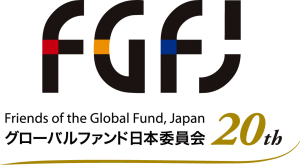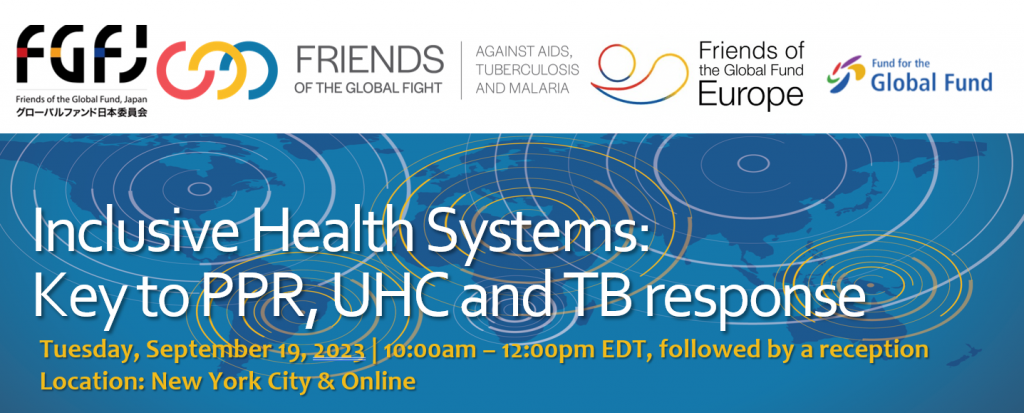
In September 2023, three health-related UN General Assembly High-Level Meetings were held, focusing on Pandemic Prevention, Preparedness and Response (PPR), Universal Health Coverage (UHC), and Tuberculosis (TB). Capitalizing on that timing, the Friends of the Global Fund, Japan (FGFJ) and its partners co-hosted a public event in New York to highlight inclusive health systems as a key common factor to address all three of these areas. In particular, the goal was to explore how the battle against AIDS, TB, and malaria can enhance healthcare systems, especially at the primary level.
FGFJ co-hosted the event with three other organizations supporting the Global Fund to Fight AIDS, Tuberculosis and Malaria (the Global Fund)—the Friends of the Global Fight (US), Friends of the Global Fund Europe, and Fund for the Global Fund.
The event featured speakers from both implementing and donor countries. It began with a keynote speech by His Excellency Budi Gunadi Sadikin, health minister of Indonesia, followed by a panel discussion featuring government officials and experts from Japan, the United States, Europe, and the Global Fund, and closing remarks from a representative of the European Commission. Approximately 100 people from across the world attended, including health experts and representatives from government, the private sector, and civil society.
This meeting proved to be a valuable opportunity for FGFJ and its partners to reinforce the message that the foundation for achieving UHC, PPR, and tuberculosis control lies in patient-centered, inclusive healthcare system strengthening. It also helped bring together representatives from Japan, Europe, and the United States with those from the Global South to align our perspectives on the role of the Global Fund in solidifying this foundation through the fight against the three infectious diseases.
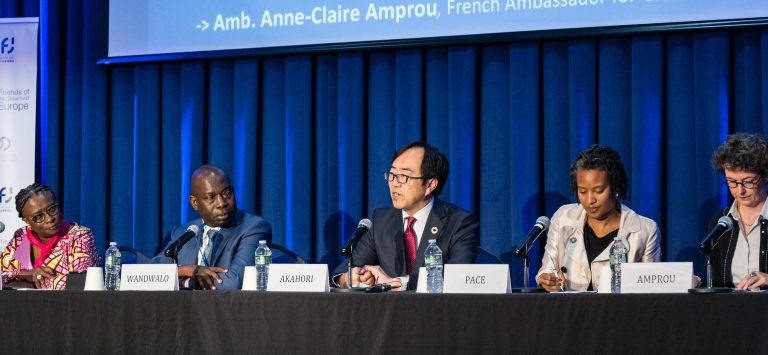
Welcome & Opening Keynote
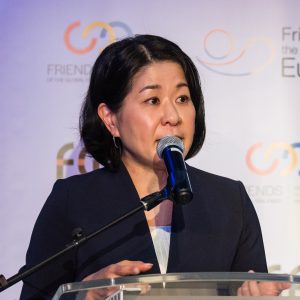 Ms. Kazuyo Kato, executive director of the Japan Center for International Exchange (JCIE/USA), welcomed the audience and introduced JCIE’s FGFJ initiative and its role in facilitating Japan’s increasing support for the Global Fund since 2004. Ms. Kato noted that Japan’s pledge amount of up to $1.08 billion in the most recent 7th Replenishment represents a five-fold increase over two decades ago, reflecting Japan’s longstanding commitment to health systems strengthening and advancing UHC. She then introduced the keynote speaker, H.E. Budi Gunadi Sadikin.
Ms. Kazuyo Kato, executive director of the Japan Center for International Exchange (JCIE/USA), welcomed the audience and introduced JCIE’s FGFJ initiative and its role in facilitating Japan’s increasing support for the Global Fund since 2004. Ms. Kato noted that Japan’s pledge amount of up to $1.08 billion in the most recent 7th Replenishment represents a five-fold increase over two decades ago, reflecting Japan’s longstanding commitment to health systems strengthening and advancing UHC. She then introduced the keynote speaker, H.E. Budi Gunadi Sadikin.
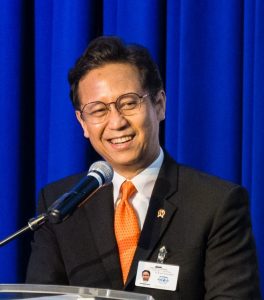 Health Minister Sadikin, who assumed his position in December 2020, shared Indonesia’s transformative shift from investing 80% of the budget in secondary healthcare toward prioritizing and standardizing primary healthcare and preventive measures to keep populations healthy. He highlighted Indonesia’s expansion of primary healthcare facilities at the village level, which have increased from 10,000 government-owned clinics in 1969 to 300,000 clinics at the hamlet level in 2023. He also discussed the country’s goals of revitalizing the primary healthcare network through digitalization of health data, strengthening Internet connectivity of clinics, and expanding health workforce training. He further spoke on the country’s immunization efforts, including its success in rolling out its first HPV vaccination program and serving as the clinical trial site for tuberculosis vaccines, as well as its progress in offering basic screening for preventive diseases. In closing, H.E. Sadikin recognized the Global Fund’s contribution to Indonesia’s rapid expansion from 2 to 56 genome sequencing labs in about six months, which has increased sequencing capacity from 140 in nine months to 5,000 in one month, and he praised Japan’s leadership in supporting the Global Fund.
Health Minister Sadikin, who assumed his position in December 2020, shared Indonesia’s transformative shift from investing 80% of the budget in secondary healthcare toward prioritizing and standardizing primary healthcare and preventive measures to keep populations healthy. He highlighted Indonesia’s expansion of primary healthcare facilities at the village level, which have increased from 10,000 government-owned clinics in 1969 to 300,000 clinics at the hamlet level in 2023. He also discussed the country’s goals of revitalizing the primary healthcare network through digitalization of health data, strengthening Internet connectivity of clinics, and expanding health workforce training. He further spoke on the country’s immunization efforts, including its success in rolling out its first HPV vaccination program and serving as the clinical trial site for tuberculosis vaccines, as well as its progress in offering basic screening for preventive diseases. In closing, H.E. Sadikin recognized the Global Fund’s contribution to Indonesia’s rapid expansion from 2 to 56 genome sequencing labs in about six months, which has increased sequencing capacity from 140 in nine months to 5,000 in one month, and he praised Japan’s leadership in supporting the Global Fund.
Panel Discussion
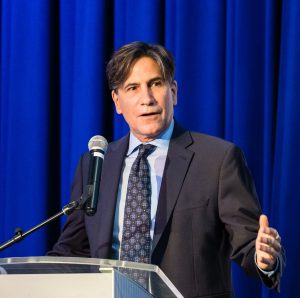
Mr. Chris Collins, president and CEO of the Friends of the Global Fight (US) took the stage to introduce the panel moderator, Dr. Magda Robalo, former minister of health of Guinea-Bissau. Before turning over to Dr. Robalo, he offered context for the discussion by identifying a number of key issues for the future of global health architecture: how to find synergies in programming and prevent new siloes in global health; how to harness the potential in digital technology, healthcare workers, communities, researchers, and the public and the private sectors to provide better health systems that address current needs as well as future threats; and how to address these issues while maintaining and reinvesting in the fight against the world’s three largest infectious diseases that continue to claim millions of lives each year. “There’s really no health security and there’s no effective universal health coverage as long as AIDS, TB, and malaria continue to rage,” Mr. Collins commented, mentioning the Global Fund as offering a critical pathway to addressing these issues.
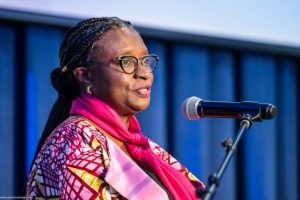 Dr. Magda Robalo began the panel by commenting on the unique partnership that the Global Fund has demonstrated over the past 20 years, which has contributed not only to reducing mortality rates and preventing diseases—particularly HIV, TB, and malaria—but also to strengthening healthcare systems and putting communities at the core of its activities. Dr. Robalo introduced the four panelists: Dr. Eliud Wandwalo, head of tuberculosis, The Global Fund to Fight AIDS, TB and Malaria; Amb. Takeshi Akahori, director-general for global issues, Ministry of Foreign Affairs, Japan; Hon. Loyce Pace, assistant secretary for the Office of Global Affairs (OGA), US Department of Health and Human Services; and Amb. Anne-Claire Amprou, French ambassador for global health.
Dr. Magda Robalo began the panel by commenting on the unique partnership that the Global Fund has demonstrated over the past 20 years, which has contributed not only to reducing mortality rates and preventing diseases—particularly HIV, TB, and malaria—but also to strengthening healthcare systems and putting communities at the core of its activities. Dr. Robalo introduced the four panelists: Dr. Eliud Wandwalo, head of tuberculosis, The Global Fund to Fight AIDS, TB and Malaria; Amb. Takeshi Akahori, director-general for global issues, Ministry of Foreign Affairs, Japan; Hon. Loyce Pace, assistant secretary for the Office of Global Affairs (OGA), US Department of Health and Human Services; and Amb. Anne-Claire Amprou, French ambassador for global health.
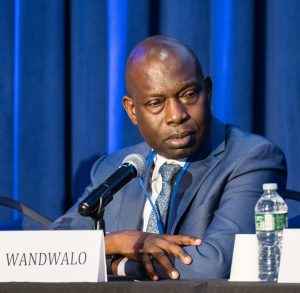
Dr. Eliud Wandwalo discussed COVID-19’s impact on TB, which was particularly dire as both are respiratory diseases. He explained how the Global Fund’s swift response to COVID-19 helped mitigate its impact on HIV, TB, and malaria. In particular, the Global Fund provided the flexibility to enable countries to use its grants to address COVID-19 and offered an additional $400 million through its COVID-19 Response Mechanism (C19RM) funding, and these contributed to the improvement of testing capabilities in many countries for both TB and COVID-19. He also pointed out that many countries adopted innovative technologies through C19RM funding, and expressed expectations that these innovations will be scaled up in routine programming.
Regarding the unique strengths of the Global Fund, Dr. Wandwalo emphasized that the true strength lies not only in the scale of its funding but in the various benefits that come with the flow of funds. He cited both professional and personal examples of engagement with the Global Fund, which illustrate how the Global Fund promotes country ownership of strategies and inclusive governance involving civil society and affected communities in decision-making, and how it created a vast medical supplies market that led to lower prices for pharmaceuticals and equipment.
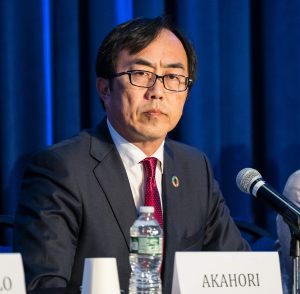
Amb. Takeshi Akahori began with a summary of the outcomes of the Hiroshima G7 Summit in 2023, which he offered in 9 letters: GHA (Global Health Architecture), UHC (Universal Health Coverage), and R&D (Research and Development). He emphasized Japan’s early achievement of UHC in 1961 and how strengthening the healthcare system to overcome the ongoing TB epidemic of that time contributed to UHC. Ambassador Akahori mentioned that Japan has prioritized global health in G7/G8 summits since 2000, when Japan hosted the G8 Summit in Okinawa, and later began highlighting UHC as well. He recognized JCIE’s long-term contributions toward putting global health at the center of Japanese diplomacy. He explained that Japan’s focus on UHC also directly relates to its policy endorsing human security, which was partially conceptualized by Sadako Ogata, the former head of UNHCR and president of JICA. Ms. Ogata emphasized human security as encompassing three components: freedom from fear, freedom from want, and the ability to live a life of dignity, which are all related to global health.
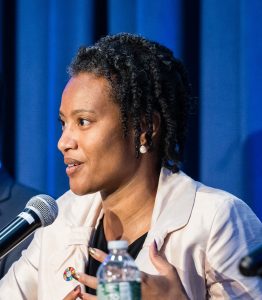
Hon. Loyce Pace recognized the importance of pulling together the themes of the three 2023 UN High-Level Meetings, noting that the meetings are not just about tuberculosis, UHC, and PPR, but about uplifting health, access, and the importance of systems and architecture including key components such as data or workforce. She stressed how, while the world has witnessed what can be done through work against TB, HIV, and malaria, progress in the fight against these diseases has now stalled and is at risk of not moving forward due to setbacks from COVID-19. Pointing out that 2023 is the midpoint to 2030 Sustainable Developmental Goals (SDGs), Ms. Pace noted that a holistic systems approach to the fight against the three major infectious diseases could turn the tide around, and that doing so is a priority of the current US administration.
Ms. Pace also discussed the need to address all of the issues that intersect with health, including climate change, interstate conflicts, and biosecurity, among others, and to think of a way forward beyond UNGA to COP28, in particular on the climate-health nexus. She noted that challenges remain to better understand and articulate the relationship between these issues and health, link policies, ensure that the efforts on respective issues are complementary, and make cross-sectoral efforts to reach the goals of the SDG2030.
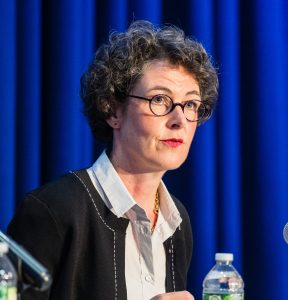
Amb. Anne-Claire Amprou reiterated France’s unwavering commitment to multilateralism in shaping a new global health architecture, noting that the COVID-19 crisis has shown the value of multilateralism. Adding to Ms. Pace’s comments, Ambassador Amprou also spoke on the connection between global health and climate change, and how the Global Fund is aware of this nexus, particularly as it relates to malaria. She noted that these intersecting issues have illustrated a need for new instruments, and that solidarity and multilateralism should remain central to global health efforts. In response to Ambassador Akahori, Ambassador Amprou and other speakers agreed that multilateralism only makes sense if it involves all stakeholders, particularly in reference to the Future of Global Health Initiatives (FGHI) discussions.
Q&A with the Audience
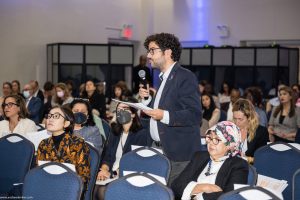 The panelists engaged in a Q&A session with the audience. Questions addressed included how to ensure that health is seen as an investment rather than an expenditure, how to strike the balance between disease-specific activities and broader systems, how the Global Fund can act with speed at times of crisis, and what role the Global Fund can play in defending human rights and LGBTQ+ populations.
The panelists engaged in a Q&A session with the audience. Questions addressed included how to ensure that health is seen as an investment rather than an expenditure, how to strike the balance between disease-specific activities and broader systems, how the Global Fund can act with speed at times of crisis, and what role the Global Fund can play in defending human rights and LGBTQ+ populations.
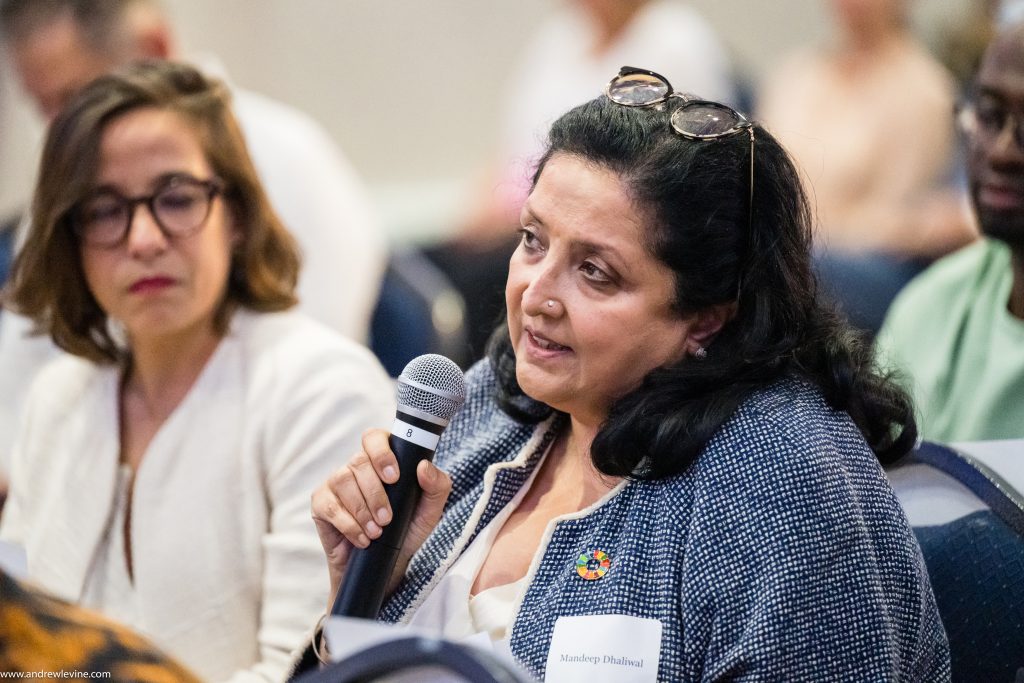 Participants referenced the Future of Global Health Initiatives (FGHI) process, asking about key steps that need to be taken to strengthen multilateralism for more effective coordination on country-led processes and funding distribution on all levels within recipient countries. Concerns were also expressed about the shrinking spaces for communities and civil society as partners in global discussions and ways to ensure that we do not reverse progress made through siloed conversations.
Participants referenced the Future of Global Health Initiatives (FGHI) process, asking about key steps that need to be taken to strengthen multilateralism for more effective coordination on country-led processes and funding distribution on all levels within recipient countries. Concerns were also expressed about the shrinking spaces for communities and civil society as partners in global discussions and ways to ensure that we do not reverse progress made through siloed conversations.
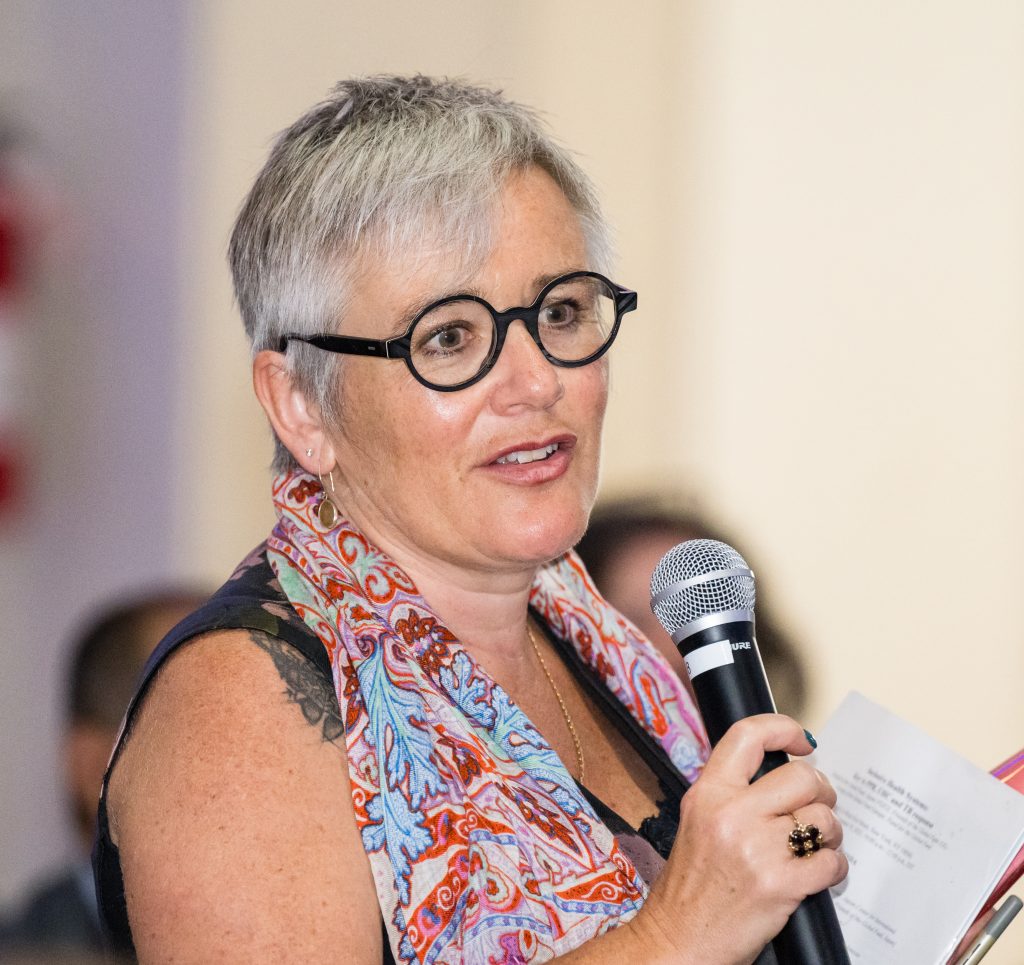 In closing, Dr. Robalo reinforced the notion of global solidarity as follows: “If the boat is going down, we will go together. Some of us may go faster than the others, but at the end of the day, we will all go down together. That’s why it is important to keep solidarity alive, to make sure equity is at the center of what we do…” She reiterated the importance of the unique partnership approach of the Global Fund in combatting and preventing diseases, strengthening health systems, and putting communities at the center of its work, asserting that partnership, solidarity, and equity prioritization are essential for achieving human security.
In closing, Dr. Robalo reinforced the notion of global solidarity as follows: “If the boat is going down, we will go together. Some of us may go faster than the others, but at the end of the day, we will all go down together. That’s why it is important to keep solidarity alive, to make sure equity is at the center of what we do…” She reiterated the importance of the unique partnership approach of the Global Fund in combatting and preventing diseases, strengthening health systems, and putting communities at the center of its work, asserting that partnership, solidarity, and equity prioritization are essential for achieving human security.
Closing Remarks
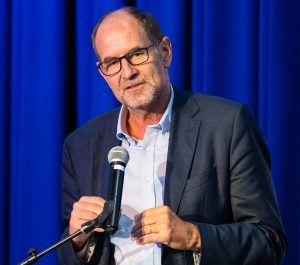 Dr. Christoph Benn, director for global health diplomacy at the Joep Lange Institute, took the stage to introduce Ms. Erica Gerretsen, director for human development, migration, governance & peace at the European Commission, who spoke on behalf of the European Commissioner for International Partnerships. Before turning to Ms. Gerretsen, Dr. Benn pointed to the growth of the UN high-level meetings on health-related topics since the UNGA first called a special session on HIV two decades ago.
Dr. Christoph Benn, director for global health diplomacy at the Joep Lange Institute, took the stage to introduce Ms. Erica Gerretsen, director for human development, migration, governance & peace at the European Commission, who spoke on behalf of the European Commissioner for International Partnerships. Before turning to Ms. Gerretsen, Dr. Benn pointed to the growth of the UN high-level meetings on health-related topics since the UNGA first called a special session on HIV two decades ago.
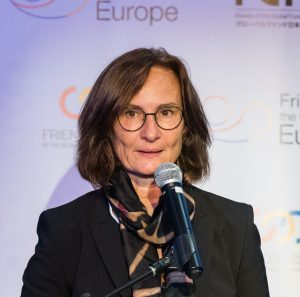
Ms. Gerretsen outlined three key principles guiding the European Union (EU)’s commitment to global health: strengthening health systems, the need for collaboration and synergy to achieve sustainability, and the principle of equity. She emphasized that the COVID-19 pandemic has demonstrated the essential role of resilient patient-centered health systems in achieving two goals: universal health coverage and health security. Ms. Gerretsen explained that through the new EU Global Health Strategy that was adopted by the European Commission last year, the EU commits to enhancing equitable access to a comprehensive spectrum of vital health services ranging from health promotion and disease prevention to affordable and equitable early diagnostics, quality treatment, rehabilitation, and palliative care. She affirmed the strong, enduring commitment of the EC and the EU member states to the Global Fund, providing around 30 percent of its resources. They will continue to call for systems strengthening and health equity as a crucial part of the GF’s work, and stress country ownership as a key component of sustainability. She concluded by expressing her gratitude for the substantive discussions and stressed the importance of addressing UCH, PPR, and TB in a comprehensive manner and the need to keep global health at the top of the political agenda.
Watch the Event Recording:
10:00-10:03 Welcome & Introduction
Ms. Kazuyo Kato, Executive Director, Japan Center for International Exchange (JCIE/USA) [representing Friends of the Global Fund, Japan]
10:05-10:15 Keynote Speech
His Excellency Budi Gunadi Sadikin, Minister of Health of Indonesia
10:15-11:35 High-Level Panel Discussion
Dr. Magda Robalo, Former Minister of Health of Guinea-Bissau [Moderator]
Dr. Eliud Wandwalo, Head of Tuberculosis, The Global Fund to Fight AIDS, Tuberculosis and Malaria
Amb. Takeshi Akahori, Director-General for Global Issues, Ministry of Foreign Affairs of Japan
Hon. Loyce Pace, Assistant Secretary for Global Affairs, United States Department of Health and Human Services
Amb. Anne-Claire Amprou, French Ambassador for Global Health
11:40-11:45 Closing Remarks
Ms. Erica Gerretsen, Director, Human Development, Migration, Governance & Peace, European Commission [on behalf of Jutta Urpilainen, European Commissioner for International Partnerships]

